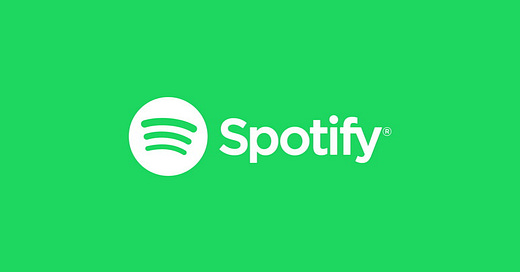NFTs are coming to Spotify
News came out today that Spotify is testing NFT integrations with a select group of musicians on their platform. For now, this just seems to be displaying NFTs, but I’m sure that there will probably come a time in the future where monetization comes into play.
To be honest, their foray into NFTs probably comes from a place of desperation rather than interest/willing to experiment. Ted Gioia is a far better expert on streaming and the business of music than I, but to summarize his points, the music labels who funded Spotify and the streaming market (regardless of its inevitability) ultimately crippled their revenue, and subsequently, musicians’ paychecks. Streaming doesn’t make nearly as much money for both labels and musicians as physical sales. Isn’t it telling that Spotify’s analytics page doesn’t even display revenue?
Aside from the self-destructiveness via streaming, you have the issue of falling subscriber numbers. Netflix announced not too long ago that they lost 200k subscribers in Q1, and expect to lose another 2 million by July. I wouldn’t at all be surprised if that number climbs higher by the end of the year. Granted, Spotify doesn’t have nearly as many direct competitors as Netflix, but you need to factor in the high cost of inflation (especially food and rent), drying up ad revenue in favor of cash reserves, and the likely high amount of job losses that will come out of the upcoming crash. Given all of that, it’s not hard to see many cutting off Spotify premium in favor of the freemium tier or piracy, leading to falling subscriber numbers.
Spotify partnered with Shopify last fall, which seems like an obvious play to capture some of the merch revenue, which is a big source of income for musicians. It makes a lot of sense to take a step further and go into NFTs, which has taken off in music thanks in part to a) the bull market, b) poor revenues from streaming, and c) inability to tour (musicians’ current biggest source of revenue).
The hype aside, why do NFTs make sense for Spotify to pursue? Well, a few reasons:
Distribution - In an industry that’s been shooting itself in the foot for a decade re: revenue, they’ll jump at the chance to make money with assets that cost them nothing to produce (all production is on musicians) and very little to infrastructure to build (mainly frontend), all ready to distribute to Spotify’s millions of subscribers and for a nice margin (split costs with marketplace).
Rent - Everybody loves being a landlord. OpenSea enables artists to create NFTs and set a resale royalty on them forever. This is probably the most important point in terms of adoption by artists and Spotify, because they’re akin to songwriting royalties in some sense, which is a minefield. There is an opportunity for Spotify to tack on a “distributor resale” fee on NFTs created via its deal with a marketplace and resold on such marketplace. Although I don’t anticipate this happening, it could for the very simple reason that OpenSea’s fees are low. If, in the future, gas fees drop a significant amount, it would justify such a move, because it would be low enough that it wouldn’t cost more than what current gas prices look like, but probably still be high enough to bring in decent cash.
Musicians - Musicians not earning nearly as enough revenue with streaming, and that’s a big headache for Spotify and labels. Older catalogs do make money, which is why so many labels did guerilla acquisitions for them, but new music largely doesn’t. This is a win-win-win for all three parties: for Spotify, it eases the pressure on increasing payments to artists for streams, and artists
Labels - Spotify has found a newfound purpose to make money! While it’s well-known that labels funded Spotify, what often doesn’t get enough coverage is that a lot of them dumped their shares, some even completely exiting their positions, on the day Spotify went public. Labels might get a cut of NFT sales, too, via contractural obligations or as part of management fees. Even if they don’t, as long as revenue is going up and they’re making money or Spotify makes money and their shares go up, they’re happy.
You may ask, but what about the bad image/PR that NFTs get? Well, it doesn’t really matter in the case of Spotify as it did with Discord. Gaming seems to harbor unusual loathing for NFTs, but Spotify’s customer base skews more towards normies that don’t really have much of an opinion. Superfans will probably support whatever their faves sell no matter what, and artists who hated NFTs before or were neutral will probably want to promote it as the market tanks this year and tour revenues dry up.
An obvious next step in Spotify’s NFT play is a partnership with a marketplace to enable sales of NFTs made by musicians. OpenSea is the obvious big candidate due to its pure size and name brand even amongst normies, but if Spotify is actually serious about exploring the space, they’re either going to have to fund or build their own infrastructure here. I doubt all the musicians will want to only sell (and for the fans to only buy) jpegs, which isn’t their core skills. Maybe OpenSea adds support to upload mp3s, but for now it’s all up in the air.
Maybe this could be a good move for Spotify, or maybe it kills the streaming industry. That discussion is for another time, though.



